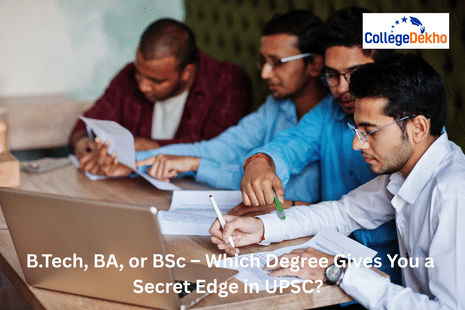Discover how B.Tech, BA, and BSc in UPSC advantages can help you leverage analytical skills, writing depth, and technical knowledge for better exam performance.

Choosing the “right” degree before aiming for UPSC often feels like picking your destiny. Many students believe engineering guarantees success, while others swear by the humanities or pure sciences. With thousands of aspirants entering from BTech, BA, and BSc backgrounds every year, the real question is whether there is any degree advantage in UPSC , or is it just a myth repeated online?
Recent analyses by leading media outlets and government-backed data sources show surprising trends. Engineers dominate selections in numbers, but toppers also emerge from arts and science backgrounds every single year. So the battle isn’t about the degree itself. It's about the hidden strengths each one brings to UPSC.
Also Check -
Advantages of Giving UPSC CSE in a Regional Language
The Big Picture: What the Data Actually Says
Official and press analyses show engineers are highly represented in selections. But numbers don’t tell the full story.
Government-backed reporting and aggregated analyses show that around 60–64% of selected candidates in recent years had engineering degrees (analysis covering 2017-2021 and government data cited by Economic Times . This indicates a strong trend, not a deterministic rule.
The All India Survey on Higher Education (AISHE) is the authoritative source on graduate populations and shows large numbers of STEM graduates overall, meaning engineers are simply a big cohort to begin with. That scale partly explains their high representation.
BTech (Engineering) for UPSC: The Analytical Advantage
Engineering trains you in problem-solving, time management, and stamina. These traits map well to UPSC prelims and CSAT. Here’s how that helps:
Prelims (CSAT + GS)
The objective-question strategy, elimination techniques, and speed useful for prelims are often among the strengths of engineers.
Mains
The writing and structure of the answers are the most among the engineers' strongest skills. The subject choices, such as Public Administration, Geography, or even Anthropology, sometimes attract engineers who switch.
Interview (Personality Test)
A technical background can be an advantage when the discussion is about the government, economy, or technology policy, but it has to be converted into administrative insight.
Quick Caveat
Engineering does not guarantee success. Many engineers choose optional subjects unrelated to engineering, and humanities skills (writing, argumentation) must be developed deliberately.
Also Check -
What is the Medium of Language in an IAS Interview?
BA (Humanities) for UPSC: The Perspective Edge
A humanities degree gives you immediate content depth for several GS papers, and optional subjects, empathy, and contextual understanding matter in bureaucracy.
Prelims & Mains
The candidate's profile is perfectly blended with History, Polity, Sociology, Philosophy, and Ethics. Bachelor of Arts graduates are often trained in the very activities of reading, essay-writing, and using concepts required for the mains exam.
Optional Subjects
Many of the top rankers prefer the humanities optionals (Sociology, History, Political Science), so a BA can cut down the learning curve considerably. According to Times of India and other reports, humanities materialise successfully when paired with structured preparation.
Interview
The students from a humanities background can expect to get their answers richer in texture when the interview board raises social policy, culture, and equity topics that they value highly.
Quick Caveat
BA students have to develop quantitative reasoning and CSAT skills as an extra training that is not included in the usual training for the humanities.
Also Check -
What Level of English is Required For UPSC?
BSc (Science) for UPSC: The Technical and Curious Middle Ground
BSc graduates unite the scientific method and the domain knowledge of an excellent middle path for certain optionals and technical policy roles.
Strengths
Scientific temperament, research skills, data interpretation, and subject knowledge (e.g., Biology, Chemistry, Environmental Science) are directly useful in GS papers and optionals like Botany/Zoology/Geography.
Policy Edge
Science grads can credibly argue on health, environment, agriculture, and technology policy in mains and interviews.
Quick Caveat
Like others, BSc students must polish essay and current-affairs linkage skills to do well across mains.
Also Check -
Should You Start UPSC Preparation from Class 11?
UPSC Preparation Strengths for BTech, BA, and BSc Students
Here’s a quick side-by-side snapshot of BTech , BA, and BSc in UPSC advantages.
Degree | Prelims Strength | Mains/Optional Fit | Interview Strength | Secret Edge |
|---|---|---|---|---|
BTech | Speed, CSAT, analytical MCQ skills | Structured answers; many switch optionals | Tech policy credibility | Exam temperament & time management. |
BA | Writing, conceptual clarity, and subject depth | Direct fit for humanities optionals | Strong socio-cultural insight | Ready-made main content and essay fluency. |
BSc | Data skills, scientific method | Fits science/technical optionals | Policy on science/health | Evidence-based answers and niche technical edges. |
A degree alone isn’t magic. BTech offers a measurable tactical advantage for prelims because of analytical training and exam temperament; BA gives a strategic advantage for mains, and BSc gives technical credibility for niche policy areas. But the real “secret edge” is how you convert your undergraduate skills into UPSC-specific capabilities.
You need to have a disciplined study routine, answer-writing, an optional choice, and current-affairs synthesis. Recent government data and press analyses confirm engineers’ strong representation. However, they also show diverse academic backgrounds among toppers. So, your degree is a head start, not a finish line.
Are you feeling lost and unsure about what career path to take after completing 12th standard?
Say goodbye to confusion and hello to a bright future!

Was this article helpful?




















Similar Articles
UGC NET Law December 2025 Expected Safe Score for JRF, Assistant Professor, PhD
CBSE Class 10 Previous Year Question Papers 2020 - Download PDF
UGC NET Law Cutoff December 2025 (Expected): Check Category-wise Cutoff for PhD, JRF & Assistant Professor
AFCAT 2026 Exam Day Guidelines: What to Carry, Reporting Time, Dress Code, Last Minute Tips
CBSE Class 10 Previous Year Question Papers 2018 - Download PDF
UGC NET Normalization Process 2025: Check How to Calculate UGC NET Marks